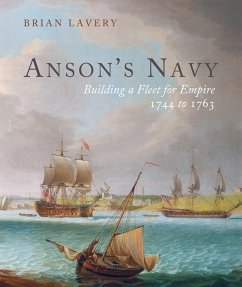Despite a supreme belief in itself, the Royal Navy of the early eighteenth century was becoming over-confident and outdated, and it had more than its share of disasters and miscarriages including the devastating sickness in Admiral Hosier's fleet in 1727; failure at Cartagena, and an embarrassing action off Toulon in 1744\. Anson's great circumnavigation, though presented as a triumph, was achieved at huge cost in ships and lives. And in 1756 Admiral Byng was shot after failure off Minorca. In this new book, the bestselling author Brian Lavery shows how, through reforms and the determined focus of a number of personalities, that navy was transformed in the middle years of the eighteenth century. The tide had already begun to turn with victories off Cape Finisterre in 1747, and in 1759 the navy played a vital part in the 'year of victories' with triumphs at Lagos and Quiberon Bay; and it conducted amphibious operations as far afield as Cuba and the Philippines, and took Quebec. The author explains how it was fundamentally transformed from the amateurish, corrupt and complacent force of the previous decades. He describes how it acquired uniforms and a definite rank structure for officers; and developed new ship types such as the 74 and the frigate. It instigated a more efficient (if equally brutal) method of recruiting seamen, and boosted morale and motivation and a far more aggressive style of fighting. The coppering of ships' hulls and the solving of the problems associated with longitude and scurvy, were also hugely significant steps. Much of this transformation was due to the forceful if enigmatic personality of George, Lord Anson. In a largely static society, he changed the navy so that it was fit for purpose, and in readiness for Nelson just decades later. Using a mass of archival evidence and a mix of official reports and personal reminiscences, this book offers a fascinating and engrossing analysis of all these far-reaching reforms, which in turn led to the radical transformation of Britain's navy into a truly global force. The consequential effect on the world's history would be huge.
Dieser Download kann aus rechtlichen Gründen nur mit Rechnungsadresse in A, B, BG, CY, CZ, D, DK, EW, E, FIN, F, GR, HR, H, IRL, I, LT, L, LR, M, NL, PL, P, R, S, SLO, SK ausgeliefert werden.









